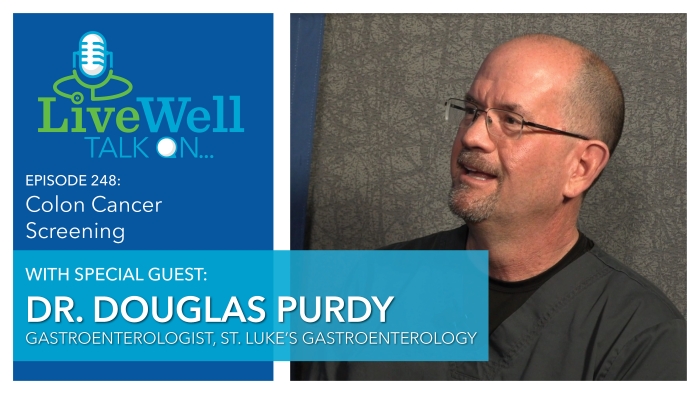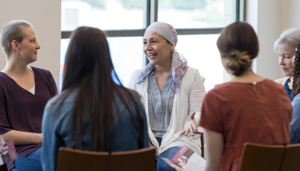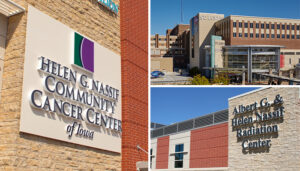Dr. Douglas Purdy, gastroenterologist at St. Luke’s Gastroenterology, joins Dr. Arnold to discuss colon cancer signs and symptoms, the importance of screening, how to reduce your risk and more.
Subscribe on: Apple Podcasts | Google Podcasts | Spotify | iHeart Radio | Pandora | SoundCloud | Stitcher | TuneIn
Host
Dr. Dustin Arnold
Chief Medical Officer
UnityPoint Health – St. Luke’s Hospital
Guest:
Dr. Douglas Purdy
Gastroenterologist
St. Luke’s Gastroenterology
Dr. Arnold:
This is LiveWell Talk On…Colon cancer screening. I’m Dr. Dustin Arnold, chief Medical Officer at UnityPoint Health – St. Luke’s Hospital. Excluding skin cancer, colorectal cancer is the third most commonly diagnosed cancer in the United States. Joining me today is Dr. Douglas Purdy, gastroenterologist with St. Luke’s Gastroenterology to discuss colon cancer signs, symptoms, and the importance of screening and how to reduce your risk for cancer. Dr. Purdy, welcome.
Dr. Purdy:
Thanks for having me, Dustin.
Dr. Arnold:
Big shoes to fill for our retired colleague, Dean Abramson. We’ll compare, you know, these two broadcasts. We’ll see how they do.
Dr. Purdy:
Don’t compare me to Dean, please.
Dr. Arnold:
I think you’re going to do great. I know we talked a little bit prior to the podcast and we make the presumption, and it’s a safe presumption, that the listeners are pretty sophisticated and they understand what colon cancer is, but could you just give us a brief overview of what is colon cancer and how does it start?
Dr. Purdy:
Sure. So colon cancer is a malignant tumor of the lower GI tract. You know, we’re talking about the colon, the lower eight inches or so of the colon we call the rectum. So sometimes you’ll hear people refer to colon cancer as colorectal cancer, same thing. And it starts as a small benign polyp, a pre-cancerous polyp, which could be, you know, a millimeter or so in size and over years that can slowly develop and grow and turn into colon cancer.
Dr. Arnold:
And in the lay public as well as in the medical literature, people are presenting younger and younger with colon cancer. Isn’t that true?
Dr. Purdy:
That’s correct. You know, colon cancer, we’ve always thought of it as being a disease of older people, but over the past several years, it’s been noticed that people younger than age 50 are developing colon cancer a lot more often. The people over 50, the incidence of colon cancer over 50 over the past several years has been decreasing about 2-3% a year. But over that same period of time, patients younger than 50, especially the 45 to 50 year old age group, it’s been increasing about 2% per year.
Dr. Arnold:
I think the hesitation to get the screening colonoscopies is part of it. Part of it, people are just so busy. I mean, I didn’t get my screening colonoscopy until this year, I’m 53. I knew I needed it at 50, I just didn’t get it done. I knew it was important, I wasn’t afraid of it. You know, just logistically, that’s how things go. And so we really want to stress that the screening colonoscopy may be a day out of your life, but could extend your life. And the inconvenience of colonoscopy is a lot better than having surgery and chemotherapy for colon cancer.
Dr. Purdy:
Exactly.
Dr. Arnold:
But I think, you know, you go from being in your thirties and your forties and you really don’t have chronic medical problems, and then you start getting in your fifties and sixties, and there’s a transition period in there where there’s denial, maybe is the best way to describe it. So what are some motivated interviewing tactics, or when you meet with people to talk to a younger person that, this is why you need a colonoscopy. What are some of your strategies?
Dr. Purdy:
Well, as they get closer to 45, you know, just tell them that the risk of colon cancer increases with age. And, you know, you’re much better off to get a screening exam, like a screening colonoscopy, where we can find these polyps in very early stages when they’re benign, pre-cancerous, but yet still benign and we can remove those and totally prevent colon cancer. Colonoscopies and removing polyps is really the only way to prevent colon cancer.
Dr. Arnold:
And it’s one of the few screening tests we have, other than bronchoscopy, and we don’t really do bronchoscopy for screening. I mean, it’s one of the few screening tests that is screening, but also therapeutic and diagnostic at the same time. Right. You know, you could see the precancerous polyp, remove it.
Dr. Purdy:
Right.
Dr. Arnold:
If you kind of war game this out a little bit, actually, the colonoscopy is probably a more efficient use of the patient’s time than would be other imaging studies that lead to more and more testing.
Dr. Purdy:
Right, there are other screening studies that you can do for colon cancer. You can do a simple test that tests for occult blood in the stool, it’s called a fit test. That’ll pick up, I believe somewhere like around maybe 72-74% of colon cancers. But we’ll miss a large percentage of significant polyps that could turn to colon cancer, you know, maybe anywhere from one to three years. So there’s just screening for occult blood, there’s the Cologuard, which I’m sure everybody’s heard. It’s on TV all the time.
Dr. Arnold:
With the cute little commercials.
Dr. Purdy:
Exactly. That screen looks at two main things: occult blood, or hidden blood in the stool, as well as altered DNA in the stool, which would suggest maybe a colon cancer. And they say that’s maybe 92% effective in finding colon cancers, but only about like 42% effective in finding large polyps of the colon. So again, you know, missing a significant number of large polyps that can turn to colon cancer.
Dr. Arnold:
Yeah. If there’s one item that people take away from this podcast, I hope they understand that the fit test, the stool test, they hopefully find the cancer early on, but they don’t prevent cancer. Where the colonoscopy, and if you have that pre-cancerous polyp removed, you have prevented cancer.
Dr. Purdy:
Right. If you have one of these other tests, a fit test or a Cologuard and it’s positive, then you really should have a colonoscopy to have the colon actually looked at and examined. And then they can see, are there polyps in there that need to be removed. And, you know, by removing those polyps, that’s what prevents the colon cancer. And then if there is a mass or a tumor, then that would be biopsied to make the official diagnosis of colon cancer or not.
Dr. Arnold:
And that comes back in a couple days after you do the biopsy?
Dr. Purdy:
Yeah, they’re usually pretty good. I mean, you can request for a 24 hour read and call, but on average the pathologists are really good here at St. Luke’s and most of our pathology results are coming back in almost 24 hours anyway.
Dr. Arnold:
Yeah, that’s reassuring to the patient. You know, no matter how much you might say this looks precancerous, it’s important to the patient, for obvious reasons.
Dr. Purdy:
Right.
Dr. Arnold:
So in your experience, what, 30 years in practice?
Dr. Purdy:
Yeah. I started in 94. So we’re going on 29 years. 29 years this summer.
Dr. Arnold:
So coming up on 30, not too long. Well, how do people with colon cancer usually present?
Dr. Purdy:
So it can really vary. It could be somebody has a change in their bowel habits. You know, they’ve been regular all their life and all of a sudden something’s changed one way or another that gets them to see their doctor. Rectal bleeding is a big one. Abdominal pain, a lot of times they’ll have no symptoms other than say, iron deficiency anemia. You know, when a patient gets referred to me for iron deficiency anemia, an adult patient, usually I tell them the number one diagnosis on my list until proven otherwise is colon cancer.
Dr. Arnold:
Yeah.
Dr. Purdy:
So, I mean, really iron deficiency anemia is a big one where we want to check the colon. But then we also have to remember, you know, a fair number of people, especially with the earlier stages of colon cancer, have no symptoms at all. And that’s where screening colonoscopy plays a big role in picking those patients up at the early stage of colon cancer, rather than waiting till it turns more advanced maybe and starts causing symptoms.
Dr. Arnold:
Yeah. Early on, well over my career—what year did you start?
Dr. Purdy:
I started here in 94.
Dr. Arnold:
I started in 96 in Grinnell. You know, we’ve come along with the survivability of colon cancer has improved. I mean, it’s pretty dramatic really. But still, the ability to prevent something I think is just the phenomenal take home point here, that you have the opportunity. You’re at high risk because you have a western diet.
Dr. Purdy:
Right, yeah.
Dr. Arnold:
And you have risk factors, you live in a first world society, so you have all the luxuries that go along with that, but you also have the risk that go along with that. And this is an opportunity to actually prevent it. I just find it amazing. I had mine this fall, pre-cancerous polyps were taken off. You know, I mean a colon cancer was prevented with that procedure.
Dr. Purdy:
Right, exactly.
Dr. Arnold:
Yeah. You talked about the risk factors. I just briefly mentioned those, but you know, we kind of group those into what we call modifiable and non-modifiable. The non-modifiable risk factors, you know, there’s not much you can do about it. It would be, you know, age as you get older, it gets a little more risk. If you have type two diabetes, that puts you at a little higher risk. Black people or higher risk for colon polyps, colon cancer. If you have a family history of colon polyps or colon cancer, especially a first degree relative, 60 or younger, or if you have two first degree relatives of any age, that puts you at higher risk. And we usually start screening well before age 45. If you yourself have a history of polyps, well that puts you at risk for more polyps and even colon cancer in the future, so you need to have your colon checked regularly. So those are things, you know, what we call the non-modifiable. And then there’s what we call modifiable risk factors. That would be things like, they say that sedentary lifestyle increases your risk of colon cancer. Obesity increases your risk. Diets that are inadequate in dietary fiber, diets that are high in red meats, you know, like beef, pork, lamb, liver, or diets that are high in processed meats like hot dogs, certain lunch meats. Smoking is a risk factor and moderate to heavy alcohol use is also a risk factor for colon cancer. So those are all things, you know, that the patient can kind of try to do something about to try to decrease their risk of colon cancer.
Dr. Arnold:
Ulcerative colitis, Crohn’s, we didn’t even mention that.
Dr. Purdy:
Didn’t mention that, but that’s a good point. Personal history of inflammatory bowel disease, especially ulcerative colitis, if it involves a greater extent of your colon, if it involves most of the colon, that puts you at higher risk, especially after you’ve had it for several years. We usually tell a patient once they’ve had ulcerative colitis that involves most of their colon for eight years or more, then we usually start doing surveillance colonoscopies about every year or two.
Dr. Arnold:
You know, that’s another thing maybe we should mention. You know, if you have inflammatory bowel disease, fit testing is not for you.
Dr. Purdy:
No, not at all.
Dr. Arnold:
Just to stress to patients that if you have that, you need to be—hopefully they’re under the care of a gastroenterologist and they’re being seen regularly.
Well Doug, I think you are doing a number one job in a number two business. Isn’t that the saying?
Dr. Purdy:
Thank you, doing my best.
Dr. Arnold:
But what got you into gastroenterology?
Dr. Purdy:
You know, during med school in internal medicine, we were exposed to it a little bit and I just thought it was very interesting because it’s just got such a vast diverse amount of diseases in it, you know, and patients that you could see. You know, the luminal GI tract, the liver, the pancreas, the bile ducts. And we are exposed to patients of all ages. We start seeing patients about age 18, all the way up, you know, through their life. And it’s a specialty where I think you can really help patients. You know, they come in with certain problems, you know, they can’t swallow food. They’re getting food stuck. You know, you do an upper scope, you diagnose a stricture, you stretch it open, put them on medication for acid reflux, and they feel a hundred percent better. So I think you can really, as a gastroenterologist, you can really make an impact in people’s lives. Some people with like, say, inflammatory bowel disease, you’ll see them maybe through your whole career because they’re patients that usually come back every year and follow up with you. So it’s just been a very rewarding career.
Dr. Arnold:
Good for you. Yeah. You guys get pretty possessive with those inflammatory bowel disease patients, because you’ve just seen them for so long.
Dr. Purdy:
Yeah.
Dr. Arnold:
Yeah, and that always good to be a part of that team. Well Doug, Dean’s got some competition. You did a great job.
Dr. Purdy:
Thank you.
Dr. Arnold:
I’m glad you were here today.
Dr. Purdy:
Thanks.
Dr. Arnold:
Once again, this is Dr. Douglas Purdy. He is a gastroenterologist with St. Luke’s Gastroenterology. To learn more about screening, visit UnityPoint.org/colon. If you’ve been diagnosed with colon cancer, any type of cancer, call the Nassiff Community Cancer Center at 319-558-4876, or visit CommunityCancerCenter.org.
Thank you for listening to LiveWell Talk On. If you enjoyed this episode, don’t forget to subscribe. And if you want to spread the word, please give us a five-star review and tell your family, friends, neighbors, strangers about our podcast. We’re available on Apple Podcast, Spotify, Pandora, or wherever you get your podcasts. Until next time, be well.







